The Champion #119 – October 2023
This issue:
- Hepatitis NSW outreach at Mid North Coast CC
- Closing The Gap at Koori Knockout 2023
- Hepatitis NSW at Migrant Information Day in Hurstville
- Hep C Learning Module now available in correctional centres across NSW
- After Cure: Hep C in a post-cure world
- Hepatitis NSW is recruiting peer workers!
- Help us improve our site and go in the draw to win $50

Hepatitis NSW outreach at Mid North Coast CC
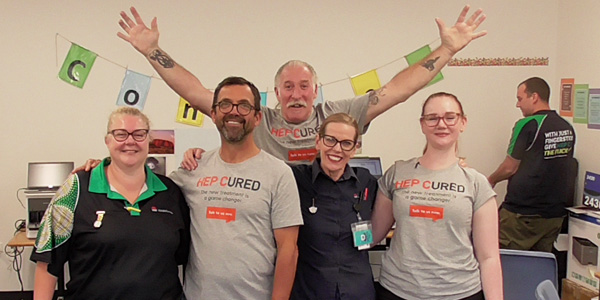
Hepatitis NSW had an incredible start to the month, kicking off with a successful high-intensity testing campaign at the Mid North Coast Correctional Centre in Kempsey.
Our peer workers Glen and Allan, together with Pippa Bray—our Program Officer for Community Testing and Treatment—joined up with the Justice Health NSW team at the correctional centre to reach out to approximately 360 individuals. They delivered education and hep C testing, as well as promotion for our Hepatitis Infoline.
Our team were extremely grateful for the warm reception from the Justice Health NSW team and are excited for the next campaign as we continue to provide healthcare directly to our community.
Closing The Gap at Koori Knockout 2023
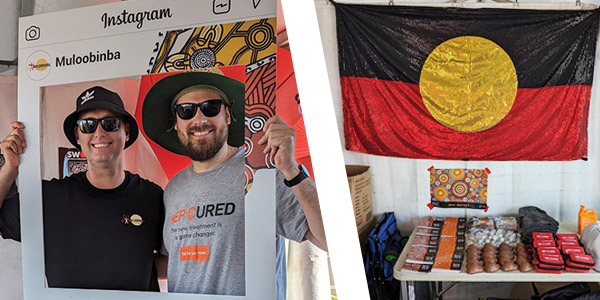
One of the biggest Indigenous sporting events in the country, the Koori Knockout, was held over the October long weekend in Tuggerah on Darkinjung Country, hosted by Newcastle All Blacks and supported by Central Coast Council and the NSW Aboriginal Land Council.
The four-day tournament featured around 150 rugby league teams from across the state, with many former and current NRL players among those competing for the titles.
Two of our peer workers—Josh and Liam—along with Priority Populations Program Manager Kyle Leadbeatter, made the trip along with our Close The Gap 414 partner organisations, SWOP and ACON, to provide information, education and support to people from the communities.
The team distributed 1,500 resources and merchandise items. These goodies were well received and popular, helping to get the message out about hep C testing, treatment and cure, and hepatitis B testing, monitoring, and treatment.
The Knockout was a great experience for the 40,000 spectators across the weekend, despite the 37-degree heat. These large and important community events give Hepatitis NSW a way to support efforts to Close The Gap in health outcomes between First Nations and the broader community. We are able to provide relevant, appropriate and up-to-date information, support and resources about hep B and hep C, directly to Aboriginal and Torres Strait people and communities from across NSW.
For the footy fans, here are this year’s winners!
Women’s final: Newcastle Yowies were crowned champions after defeating Redfern All Blacks 13-12.
Men’s final: Walgett Aboriginal Connection overcame Wiradjuri Aboriginal Rivers winning 22-12.
Hepatitis NSW at Migrant Information Day in Hurstville
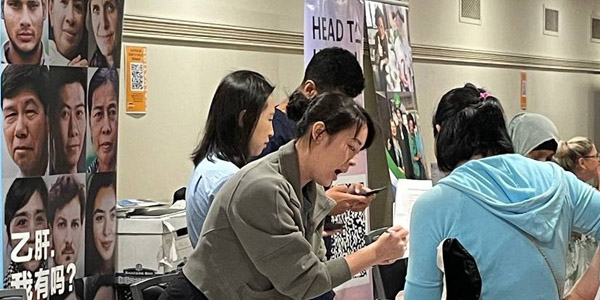
Advance Diversity Services (ADS) hosted its annual Migrant Information Day at Hurstville’s Marana Auditorium and Civic Theatre on 11th October.
This annual free community event was initiated by the St George Multicultural Network, serving as a vital resource for new migrants and refugees for over two decades, providing valuable information on various aspects of integration including housing, health, employment, education, support, and government services. Hepatitis NSW joined the St George Liver Clinic at their stall to meet attendees that came from across the state.
A primary aim of the event is to reach people from CALD communities, and Hepatitis NSW provided in-language resources in Korean, Chinese and Vietnamese. Our Korean staff member Mina Kim—alongside our university work placement student Josie, who speaks Mandarin—were able to assist Korean and Chinese participants in understanding important information about liver health and hepatitis B and C. A big “Thank you!” to Josie!
Hep C Learning Module now available in correctional centres across NSW

The Hep C online learning module has gone live this month across correctional centres in New South Wales.
People in custody can complete the module via in-cell tablet technology, and then obtain a certificate of completion and information pack by contacting our Infoline.
The module was developed by Hepatitis NSW in partnership with Justice Health NSW. The module provides information about hepatitis C, treatments, getting tested, and how to avoid infection. It uses accessible language, visuals and animation, as well as short videos featuring stories from people in custody, detailing their experiences with the illness and accessing treatment. It can be accessed through the Justice Health NSW prison portal and will soon be available on the Hepatitis NSW prison website.
Given that people in correctional centres are at higher risk of hepatitis C infection, this new module can help them to avoid infection, as well as urging those living with hepatitis C to seek treatment.
After Cure: Hep C in a post-cure world
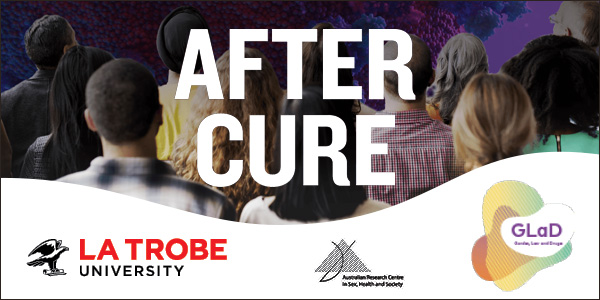
Do stigma and discrimination persist for people after they’ve been cured of hepatitis C?
The Australian Research Centre for Sex, Health and Society at La Trobe University recently launched the results of their three-year research project “Hepatitis C-related stigma and discrimination in a post-cure world”, a national qualitative study that interviewed people treated for hep C and people who worked with affected communities about life after cure.
Hepatitis NSW assisted in putting out the call for participants, resulting in 20 people being interviewed from NSW, joining more from Queensland and Victoria.
As well as publishing research articles and reports, the team at La Trobe University made their findings more accessible to the public by creating a podcast about people’s experiences. In this audio documentary, three people tell their personal stories of life before and after treatment, alongside other voices reflecting on stigma, discrimination, cure, the law, hepatitis C elimination and what needs to happen next. The podcast is called ‘After Cure’ and you can listen to it by clicking >>>here.
The study confirms that people who have received treatment for hep C may still experience stigma and discrimination even after cure. Some participants highlighted the stigmatising behaviour of family, friends and even healthcare workers who continued to label them as infectious, or imply that they couldn’t be trusted to remain free of the virus. They might be labelled as drug users and thus heavily stigmatised. Also, legal approaches to hepatitis C are often inconsistent, and need updating to reflect the advent of curative treatment.
This was the first Australian study to map the laws and policies impacting affected people, identifying the need for multiple reforms. In their summary report, the researchers presented 20 recommendations for changes to policy, practice and law, in migration law, criminal law, insurance law, and other areas.
Hepatitis NSW is recruiting peer workers!
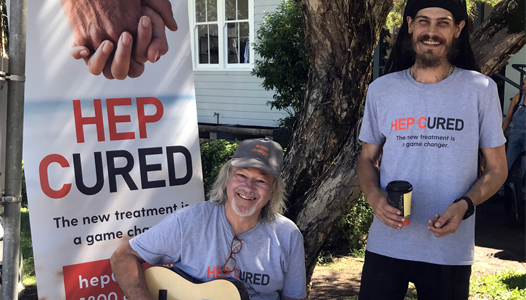
We’re looking for people in the Sydney metro area with lived experience of hep C to become peer workers at Hepatitis NSW. The work is rewarding, paid, typically a couple of hours each session, and an exciting way to be part of making hep C history. We offer full training and support; our peer workers are an extremely important and valuable part of our team.
Hepatitis NSW’s Peer Partnership Program helps make hep C healthcare easier to access for people in the community.
Our peers work in collaboration with our amazing nurse and healthcare partners, helping people to access the hepatitis healthcare they need – at methadone clinics, homelessness services, youth services, residential rehabs, and other sites. Peers engage with clients of those services and encourage them to get tested for hep C, to check their liver health, and get their hep C cured.
You don’t need any qualifications, past training, or previous experience to be perfect for this role. Anyone can become a great peer worker – all you need is lived experience of hep C and cure, and a passion for helping others get cured of hep C. We pay our peer workers well, we cover all expenses, we offer paid training, and we provide opportunities to attend events and conferences. For many of our peer workers, this role has been a great steppingstone to work in the community health sector.
We’ve got a wonderful team of around 20 peer workers across NSW, and we’d love to grow our team. No matter where you are in NSW, what your background is, or what your experience is, if you’ve had hep C in the past, and been cured with the new treatments, then we’d love to hear from you about becoming a peer worker.
Please contact us through this form on our website >>>CLICK HERE
Help us improve our site and go in the draw to win $50!
We’re striving to make our website as easy to access and comprehensive as possible. If you have two minutes, we’d love it if you could participate in our quick survey to help us improve the Hepatitis NSW website. To show our appreciation, we’ll put you in the weekly draw to win $50!
To do the survey >>>CLICK HERE






